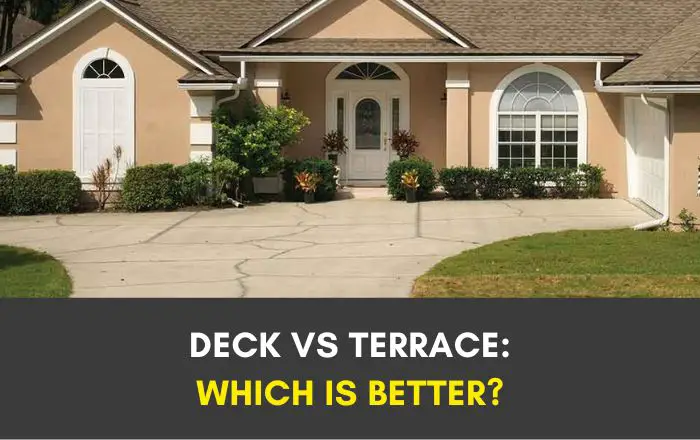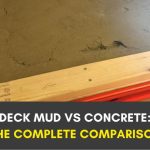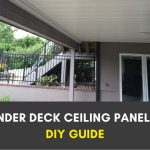Both decks and terraces are great spots for relaxing and having fun, but they’re quite different.
A deck is a raised outdoor area, usually made from wood or a mix of materials. It’s higher off the ground and can be attached to your house. On the other hand, a terrace is usually cheaper to build. It’s a flat, open space that can be on the ground or on a rooftop.
Decks need regular care and can increase your home’s value. You can also design them the way you like.
Terraces are less customizable but are a good, cost-effective option for outdoor space. This guide can help you understand the differences so you can choose what’s best for your home.
Comparison Between Deck And Terrace
Decks and terraces are both great for hanging out and having fun, but they’re pretty different. People often mix up the two, but they have their own unique features.
What Is Terrace?
A terrace is usually a flat area that comes out from a house. It’s often seen on rooftops in cities where space is limited.
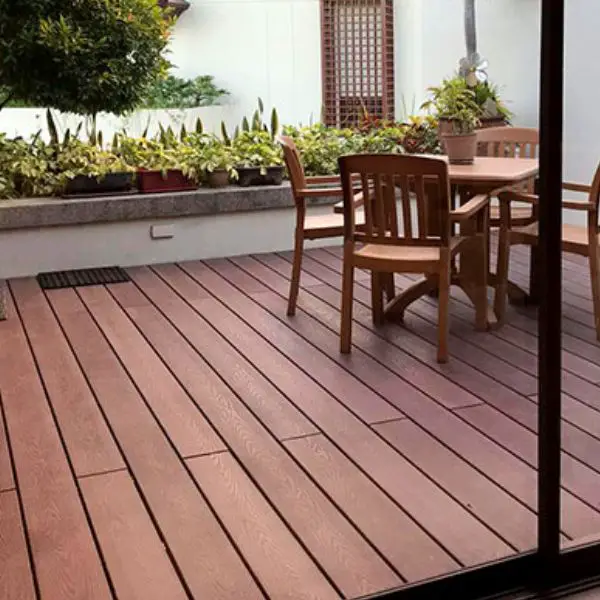
They can be made of wood, but they’re also built with concrete, stone, or tiles. They’re good for parties and enjoying city views, but sometimes they don’t have much privacy.
You can add walls or overhangs for more shade and privacy. Building a terrace on the ground is cheaper than one on a rooftop.
Pros
- Usually cheaper to build than a deck.
- Offers unique views, especially rooftop terraces in urban areas.
- Versatile use of space (e.g., garden, dining area).
- Requires less maintenance compared to wooden decks.
- Can be a good use of otherwise unused rooftop space.
- Adds additional outdoor living area to homes with limited yard space.
Cons
- Less privacy, especially in urban settings.
- Fewer customization options than decks.
- Not directly connected to the house, which may limit accessibility.
- May require significant structural support, especially for rooftop terraces.
- Can be expensive to renovate or upgrade.
- Potential for water leakage issues if not properly constructed or maintained.
What Is Deck?
A deck is a raised outdoor area, sometimes attached to a house. You mostly find them in houses in the north.
They’re usually made from treated wood or composite materials, not natural wood, to avoid damage from weather like rain or snow.
Decks can have different levels and usually have railings around them. You can decorate them with plants and lights to make a cozy outdoor spot. They can be designed in many ways, so you can make them look how you want.
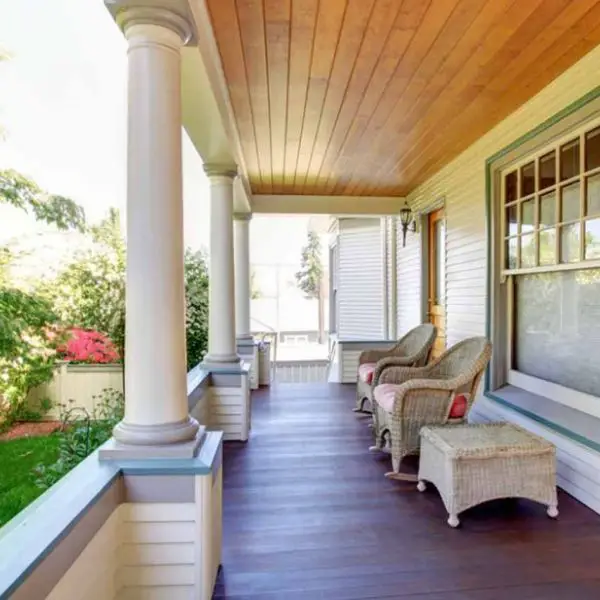
Pros
- Enhances outdoor living space.
- Can be customized in design, size, and materials.
- Increases property value.
- Direct access from the house.
- Variety in levels and styles.
- Can be painted or stained to match home aesthetics.
Cons
- Higher construction and material costs.
- Requires regular maintenance, especially wood decks.
- Susceptible to weather damage like warping or rotting.
- May need permits for construction.
- Elevated structure can be a safety concern without proper railings.
- Limited use in urban areas with small yards.
What’s The Difference Deck Between Terrace?
Decks Can Be Customized More
Decks offer a lot of flexibility in design. You can choose different shapes, sizes, and materials like wood or composite. This means you can make your deck fit the style of your house and your personal taste.
You can add features like built-in benches, different levels, or special railings. This customization makes decks a popular choice for those who want their outdoor space to have a unique look.
Building A Terrace Can Be Cheaper Than A Deck
Building a terrace is often less expensive than building a deck. Terraces are usually flat and can be made on the ground or as part of a rooftop.
This means they don’t usually require the complex structures and materials needed for an elevated deck. The cost can vary depending on the materials and location, but generally, terraces are a more budget-friendly option for creating outdoor living spaces.
Decks Need More Upkeep
Decks typically need more maintenance than terraces. This is especially true for wooden decks, which need to be cleaned, stained, or sealed regularly to protect them from the weather, like rain or sun damage.
Without proper care, decks can suffer from issues like warping, splintering, or fading. While composite decks require less maintenance than wood, they still need some care to keep them looking good and safe to use.
Terraces Offer Unique Urban Views
Terraces, especially rooftop ones, can provide unique and stunning views of the cityscape. They are particularly popular in urban areas where space is limited.
Having a terrace in such locations can turn a simple rooftop into a scenic retreat, where you can enjoy panoramic views of your surroundings. This feature is something that ground-level decks, in most cases, can’t offer.
Decks Can Increase Property Value
A well-built and aesthetically pleasing deck can add significant value to a property. They are seen as a desirable feature by many homeowners, providing an attractive outdoor living space that extends the home’s living area.
When it comes to selling a house, a deck can be a key selling point, potentially increasing the property’s market value and appeal.
Terrace Provides More Flexible Usage of Space
Terraces, particularly flat rooftop ones, can be versatile in terms of usage. They can serve as a garden space, an outdoor dining area, or even a place for installing small pools or hot tubs.
This flexibility makes terraces a valuable addition to homes that lack garden space or have limited outdoor areas. The ability to utilize this space in various ways adds to the overall functionality of a terrace.
Cost of Construction Varies
The cost of constructing a deck or terrace can vary significantly. Decks, especially elevated ones with custom designs and materials, can be more expensive.
The cost includes not just the materials but also the structure and support needed for elevation.
In contrast, terraces, especially those built on flat or existing surfaces, tend to be less expensive due to simpler construction requirements and less material complexity.
Different Materials for Different Styles
The materials used for decks and terraces differ, reflecting their different styles and uses. Decks are commonly made from wood or composite materials, offering a warm, classic look.
They can also be stained or painted to match the home’s exterior. Terraces, however, are often built with materials like concrete, stone, tiles, or sometimes wood, providing a more diverse range of styles and textures. This difference in materials also affects their durability and maintenance needs.
Location and Accessibility
The location of decks and terraces plays a key role in their design and function. Decks are typically connected to the house and can be built at various levels, offering direct access from the home and creating an extension of the living space.
Terraces, on the other hand, can be located on rooftops or ground level, providing an open and flat area that can serve as an additional outdoor living space. Rooftop terraces are particularly popular in urban settings where ground space is limited.
Final Thoughts
Decks and terraces offer different advantages. Decks can enhance your home’s look and are great for outdoor fun.
They’re more common in places where people love outdoor living. Terraces are less costly and offer more space, especially in urban areas. Choose what works best for your home and lifestyle.
Hina Kanwal is the dynamic force behind Deckfaqs.com, blending her expertise in deck design with actionable insights. Known for her engaging content and practical advice, she empowers homeowners to elevate their outdoor spaces. Her passion and knowledge make her a trusted voice in the world of deck-building.

